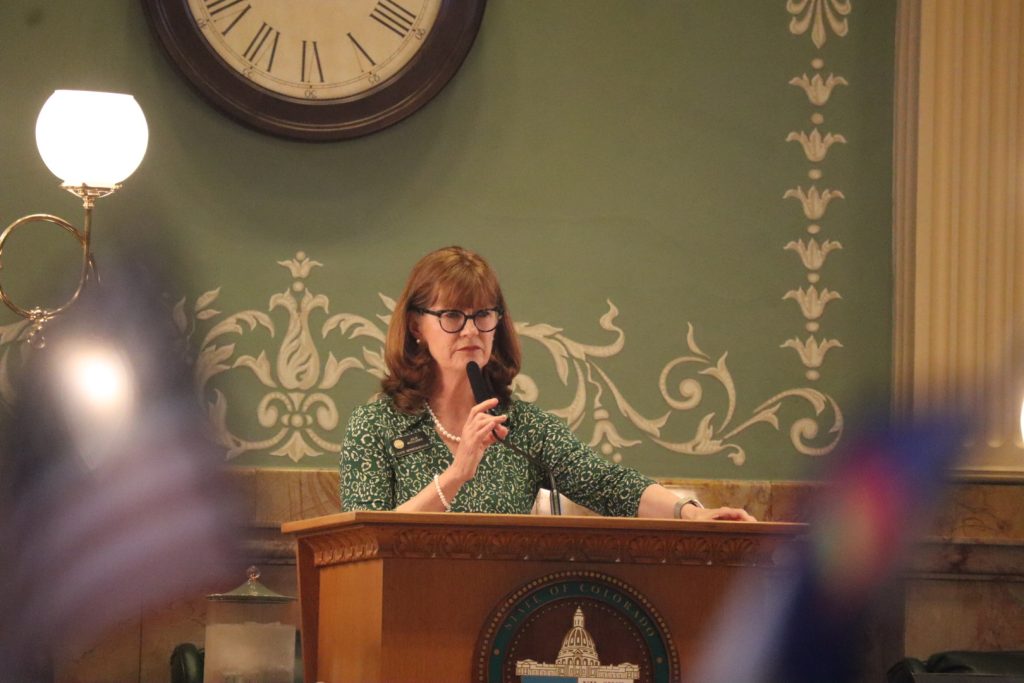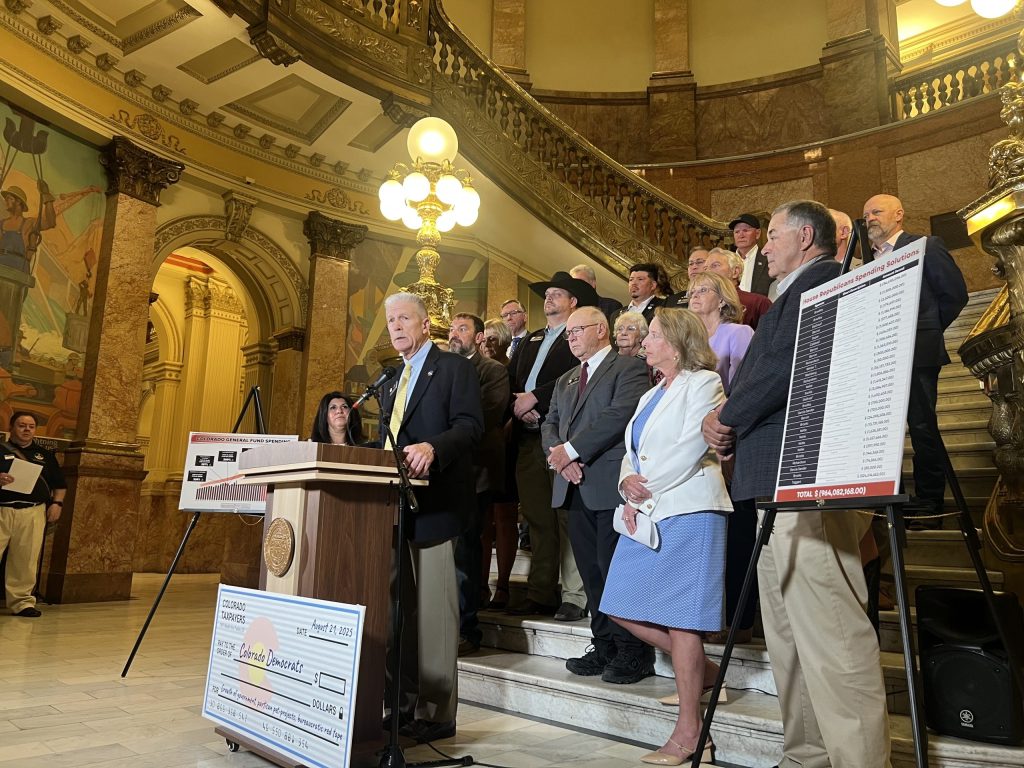As Colorado lawmakers move to stave off higher health insurance costs, they want Congress to do the same
Insurance premiums for Coloradans on the individual marketplace are expected to surge next year if Affordable Care Act subsidies are not renewed

Robert Tann/The Post Independent
Democrats and Republicans in Colorado’s statehouse seem to agree: Something needs to be done to avoid surging health insurance costs next year.
Where they differ, as usual, is on the solution.
Lawmakers are currently meeting for a special legislative session to respond to the fallout of the sweeping tax and spending-cut measure passed by Republicans in Congress and signed into law by President Donald Trump on July 4.
Along with closing a $783 million budget gap as a result of less income tax revenue, lawmakers want to blunt the expected increase in health insurance costs for Coloradans enrolled in the individual marketplace, called Connect for Health Colorado.
The state’s insurance division projects that average premiums could rise 28% statewide in 2026 as a result of expiring tax credits for Affordable Care Act marketplaces that were not renewed in Republicans’ tax bill.
On the Western Slope, where health care is already more limited and expensive, average increases could be upwards of 40%.
State Republicans have uniformly defended Congress’ tax bill, saying it delivers financial relief by extending and expanding tax breaks to companies and individuals that were enacted during Trump’s first term. But some also want to see their counterparts in Congress do something to avoid the looming health insurance subsidy cliff.
“I know we’re all talking to our Congress people right now on the same subject, and they all know that this has a very detrimental impact,” said Rep. Rick Taggart, R-Grand Junction, who sits on the Joint Budget Committee.

Taggart said he’s heard from U.S. Rep. Jeff Hurd that extending subsidies is a “priority” for him.
Hurd, a Grand Junction Republican who represents much of the Western Slope in the U.S. House, confirmed he is working on legislation to “help alleviate the immediate removal of these vital tax credits, while still recognizing the long term impacts of healthcare spending,” according to a statement shared through his spokesperson, Nick Bayer.
“I am concerned about the immediate drop off of the expiring (tax credits) and its effect on families in rural districts like mine,” Hurd said.
Bayer said Hurd is working with the relevant congressional committees and U.S. House leadership on the measure.
It’s not clear how much support there is in the Republican-controlled Congress to pass an extension, and lawmakers have a short window to act. The subsidies are set to lapse at the end of this year.
Democrats are furious that Republicans in Congress chose not to renew the subsidies in their megabill, which Hurd voted for.
Senate and House Democrats sent a joint letter earlier this month to Colorado’s federal delegation, stating that the “GOP-led Congress is making a conscious choice to dramatically increase people’s health insurance costs.”
State Sen. Jeff Bridges, D-Greenwood Village, said he also blames congressional Democrats for not making health insurance a big enough issue. He specifically called out Senate Minority Leader Chuck Schumer of New York for what he sees as a lack of messaging.
“They are not talking about the impact (the GOP bill) has on insurance premiums,” said Bridges, who chairs the budget committee that Taggart sits on.
Democrats are advancing a handful of bills during the special special session aimed at bolstering the state’s Health Insurance Affordability Enterprise, which funds subsidy programs meant to help keep the cost of insurance down.
Democrats’ centerpiece bill would funnel $100 million into the fund using money from the state’s Unclaimed Property Trust Fund, which maintains about $1.2 billion in lost assets, such as unpaid wages, forgotten bank accounts and abandoned property that the state is holding. Funds would be directed in the form of an interest-free loan.
House Speaker Julie McCluskie, D-Dillon, said channeling that money into the health enterprise fund could help keep some people insured next year who may otherwise lose coverage because of the increased costs.
The state’s insurance division estimates around 100,000 Coloradans could be at risk of losing health insurance on the individual marketplace — roughly a third of all people currently covered by Connect for Health Colorado.
McCluskie said she believes Democrats’ bill could help roughly 20,000 people keep their insurance.
“It is not enough,” she said. “The state is asking and demanding that our Congress members step up, that they come together to ensure that these (subsidies) are extended.”
Republicans oppose Democrats’ bill, calling the use of the unclaimed property fund irresponsible. They introduced bills that instead would have reallocated current funds in the health enterprise by restricting funding for undocumented immigrants.
The state’s OmniSalud program, which is funded through the health enterprise, provides insurance coverage for immigrants who fall under a certain income threshold, regardless of their status or documentation.
OmniSalud has had around 33,000 enrollees since its inception in late 2022. The nonpartisan Legislative Council Staff projects that spending on the program will reach $90 million this fiscal year, and $20 million next fiscal year. Funding comes from fees levied on insurance companies.
Republicans’ bills would have effectively ended OmniSalud and redirected those funds to other affordability measures like the state’s reinsurance program. Those bills were killed by Democrats in committee hearings on Thursday.
Lawmakers will not address changes to Medicaid during the special session.
The GOP megabill is projected to decrease Colorado’s federal Medicaid funding by billions of dollars, but most changes aren’t set to go into effect until 2027. Lawmakers will likely begin to tackle that issue during the regular session that begins in January.

Support Local Journalism

Support Local Journalism
Readers around Glenwood Springs and Garfield County make the Post Independent’s work possible. Your financial contribution supports our efforts to deliver quality, locally relevant journalism.
Now more than ever, your support is critical to help us keep our community informed about the evolving coronavirus pandemic and the impact it is having locally. Every contribution, however large or small, will make a difference.
Each donation will be used exclusively for the development and creation of increased news coverage.










